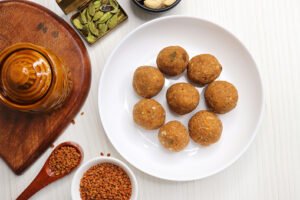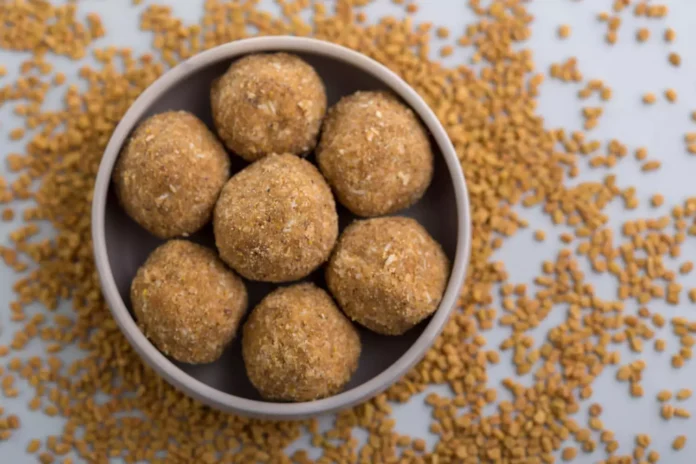Fenugreek laddus: Living with diabetes requires adopting a healthy diet, and finding suitable alternatives to satisfy your sweet tooth can be challenging. Fenugreek laddus, a traditional Indian sweet made with fenugreek seeds, offer a delicious and nutritious option that can help control blood sugar levels. This article will guide you through the process of making fenugreek laddus, while highlighting their potential benefits for individuals managing diabetes.
Fenugreek seeds contain bioactive compounds, including soluble fiber and alkaloids, which have been found to have several health benefits for individuals with diabetes. Researchers have reported that fenugreek seeds may help regulate blood sugar levels, improve insulin sensitivity, and reduce the risk of developing complications associated with diabetes.
Read this also: Effective Home Remedies for Eye Flu Treatment
Recipe for Fenugreek Laddus

Ingredients:
– 1 cup fenugreek seeds
– 1 cup desiccated coconut
– 1 cup jaggery or other natural sweeteners suitable for diabetes
– 1/2 tsp cardamom powder
– 2 tbsp ghee (clarified butter)
– A handful of crushed nuts (optional)
Instructions:
1. Dry roast the fenugreek seeds on low heat until they turn golden brown. Allow them to cool down, and then grind them into a fine powder using a blender or a food processor.
2. In a separate pan, heat the ghee over medium heat. Add the desiccated coconut and roast it until it turns golden brown and releases a pleasant aroma.
3. Add the powdered fenugreek seeds, jaggery, and cardamom powder to the roasted coconut. Mix well until all the ingredients are combined.
4. Continue stirring the mixture on low heat for a few minutes until the jaggery melts, and the mixture starts to come together.
5. Remove the pan from the heat and allow the mixture to cool down slightly, making it easier to handle.
6. Take small portions of the mixture and shape them into bite-sized laddus using your hands. You can also roll them in crushed nuts like almonds or pistachios if desired.
7. Allow the laddus to cool completely before storing them in an airtight container.
Benefits of Fenugreek Laddus for Diabetes:
1. Regulating blood sugar levels: Fenugreek seeds contain soluble fiber that slows down the absorption of carbohydrates, which can help prevent blood sugar spikes after meals.
2. Improving insulin sensitivity: Fenugreek seeds may enhance insulin sensitivity, making your body more responsive to the insulin it produces or receives externally.
3. Providing essential nutrients: The ingredients in fenugreek laddus, such as fenugreek seeds, coconut, and nuts, are packed with vital nutrients like dietary fiber and healthy fats that support overall wellbeing.
Precautions:
Even though fenugreek laddus have potential benefits for diabetes management, it is essential to consume them in moderation. Each person’s response to fenugreek seeds can vary, so it’s important to monitor blood sugar levels and consult with your healthcare provider before making significant changes to your diet.



